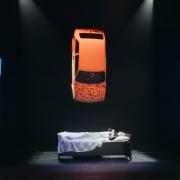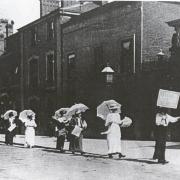Lockdown means that the doorstep delivery is back in vogue. Richard Hughes recalls when it was an everyday part of life

One of the few positive things to come out of the recent strange and turbulent times has been the resurgence of home deliveries from small independent businesses. With many restaurants turning their kitchens into takeaways, and many of the suppliers who would once service those same restaurants delivering direct to the customer, the man, or lady, with a van has now become one of life’s essentials.
On the coast, fisherman are hauling their catch direct to the home kitchen, some butchers have struggled to keep up with demand, their trade increasing by 50% as they lay sausages on your doorstep, and bakers leave bread and buns wrapped in greaseproof paper, signalled by a knock and a hasty retreat, by your front door.
The excitement of a delivery man bringing something other than an Amazon parcel leaves the isolated feeling somewhat giddy with excitement. Even the milkman has had a renaissance, with the doorstep pinta becoming an essential early morning drop. Sales are rocketing for that dawn chorus of chinking silver-topped bottles. We can but hope it will continue to be this way.
I was born and bought up in the Fenland village of Christchurch, twixt Manea, March and Downham Market. With one shop and two pubs being the hub, few households having the luxury of a car, and public transport being two buses a week to March, seven miles away, deliveries were an essential part of village life.
Some 50 years have passed since these characters appeared at regular intervals, but strangely enough I can remember their names and even their delivery times, like the distant recall of a childhood book. Not quite Mr Bunn the baker and the tricycle-riding Windy Miller but just as memorable.
Even the shop in the village did deliveries, though it was a mere five-minute walk away. If something was forgotten, which was a very rare occurrence, it was quite an adventure making the trip to see what else was on the shelves. Like many households, my Mum has a little red book where she would write the following week’s order in, so Mondays and Thursday Mr Hutchinson would bring the boxes of essentials, and on Saturday someone else would ‘do the rounds’ to collect the money.
We had a single paper delivery every Sunday, usually around 3pm and yes, we would get the Sunday People, but more importantly he would open the double doors of his van to sell sweets. I’ve always been a quantity over quality man when it comes to sweets, and the preferred choice would be packet after packet of those pastel coloured pill-like fizzers.
I’d empty them all out into an old biscuit tin. It usually housed my Matchbox cars and even now I can recall the faint tinge of rust that used to accompany the inevitable burps. I would still wolf them down, the fear of poisoning pushed firmly to the back of my mind.

On occasions, a fish and chip van would appear at about 7pm on a Friday, though you could never really rely on it. There would often be tears and crushing disappointment. Either you would have already eaten your tea, only for the van to appear, or you’d be starving hungry and waiting in anticipation, only for the hazardous fat fryer on wheels never to turn up.
I was most fascinated by tailor Billy Wright, whose shop was in March town centre. He would travel around the neighbouring Fenland villages, often appearing around 8pm, when most of us were ready for bed.
He came to Christchurch, once a fortnight, mainly selling ties, handkerchiefs, vests, shirts, socks and cardigans. With immaculate customer service, he would have every customer’s measurements noted down on his trusty wire-bound pad. Again, all financial transactions were noted in the all-important book, and an agreed amount was paid every fortnight.
I suppose Mr Wright was the forerunner of the ‘club book’. Like most children of the 1960s and 70s, the club book was the most important book in the house. I still quite like to play the endless game of opening it at a random page and giving myself the difficult choice of picking one item per page I would buy.
Spikings and Sons the butcher would come once a week from Upwell, and, right up until their closure in 2017, my mum would still buy me a pound of their sausages to bring back to Norwich. I miss my mum, and those sausages!
John Baxter the milkman would come six days a week, and, with his returnable glass bottles and electric milk float, he seems to have been way ahead of his time. Saturday would be a late morning delivery so he could collect what was owed.
We had fruit and veg sellers who never did particularly well, given that they were in the heart of the Fens. The Avon lady called, as did the football pools collector and, most crucially, Mr Cook, who would collect my dad’s union subscription at 10am on a Sunday morning.
There was one man, however, whose visit was the absolute pinnacle of the week. A blast on the hooter signalled his arrival. Fancy tunes were not needed to draw the throngs out on to the street for Friday night meant one thing; the visit of Pocklington’s ice cream van.
And what an ice-cream van. To begin with you actually climbed up polished metal steps and into the very inside of the red and white van where you would stand behind the eye-level Formica counter and peer over at the array of sweets, chews and crisps that were on offer.
I can remember the agonies of choice now.
Should I buy that lovely fake sugar-coated tobacco that came in a waxy packet with a ship on the front, just like Dad’s Old Holborn? Should I take a gamble on a lucky bag containing all manner of sticky gums and a plastic put-together-but-never-fits non-descript vehicle or should I go for a pocket-load of four-for-a-penny packets of Parma Violets, fizzy tablets that you could taste in your sleep or the hard, glass-like fruit balls that cut your tongue to shreds?
Beyond the counter, tucked behind the driver’s seat, there in the pale green chests was the cold gold – Pocky’s ice cream and lollies. And these really were lollies.
Set on a huge wooden stick, if you opened your chops as wide as you could, you still couldn’t manage to get it all in. Your efforts would end with frostbite in the two corners of your mouth, but the pain and pleasure would have been well worth it. Taking care with the splinters from the sticks, these lollies would seem to last forever.
The older folk – that’s anyone over the age of 14 – would go for an ice cream. Scooped out by hand, there was a choice of four flavours. Balanced precariously on a cornet, this was a seriously hard, creamy confection, far too hard to take a Flake.
On rare occasions – and if you were really lucky – you might get it rolled in hundreds and thousands, but never in any sauces or other additions. This was the real McCoy and needed no frivolous adulterations.
In these days of choice designer, and often hugely expensive, ice creams I’d take one of Pockies’ huge, yellow banana lollies any day.
On odd summer evenings a jangly ice cream imposter would appear selling some frothy whippy confection. I never trusted them and would always buy one of the more daringly flavoured lollies, like shandy or cola.
There was even a short-lived lager and lime effort. The thing I most remember, is that, because they were a niche product, they were always tinged with the taste and smell of diesel, living in a freezer that sat just above the fuel tank!
I do have some hope that when everything returns to some sort of normality, we will still see a return to these heady, more civilised and personal days. This wasn’t cold-calling but the appearance of someone you knew, loved and wanted to see.
There’s a ‘modern’ corporate phrase that is often bandied around by well-meaning marketing types; ‘people buy from people’. Amazing isn’t it, like they’ve just discovered this obvious truth.
There’s no better person to buy from than the one with a van full of goodies, on your own doorstep.
Richard Hughes is chef/director at the Assembly House, Norwich and runs the Richard Hughes Cookery School



























